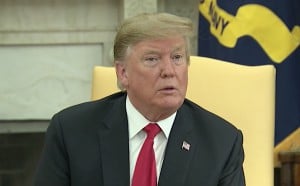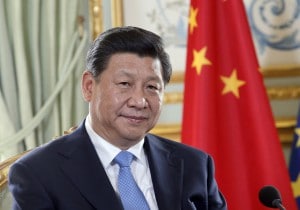The Trump administration is continuing to press ahead with its trade war in China even despite signs that the fight over trade is beginning to curb economic growth.
In the latest move, the U.S. Treasury Department has labeled China a currency manipulator, escalating the U.S.-China trade war with a significant rebuke to Beijing.
The U.S. last made this charge in 1994, but China’s been accused of this repeatedly since then. The move increases tensions between the two economic behemoths, and makes a trade deal between the two countries more difficult to negotiate.
(Trump Criticizes GM Investment in China)
“These moves represent a significant escalation in the trade war,” Joseph Brusuelas, chief economist for RSM, a global financial advisory firm, told the Wall Street Journal.
Automakers have been pushing the Trump administration to complete a trade deal with China. Craving a consistent set of rules and tariffs, automakers are looking to make plans for the future and a lack of a deal makes that impossible.
Treasury Secretary Steven Mnuchin designated China a currency-manipulating country a day after the nation’s central bank allowed the Chinese yuan to fall to a new low against the U.S. dollar.

If the trade talks between the U.S. and China falter, this picture’s going to be less frequent in the short term.
“Secretary Mnuchin, under the auspices of President Trump, has today determined that China is a Currency Manipulator,” the department said in a statement.
“As a result of this determination, Secretary Mnuchin will engage with the International Monetary Fund to eliminate the unfair competitive advantage created by China’s latest actions,” it continued.
Trump tweeted, “China has always used currency manipulation to steal our businesses and factories, hurt our jobs, depress our workers’ wages and harm our farmers’ prices. Not anymore!” Trump tweeted Monday.
(Trade Talks With China Vital to U.S. Companies)
Despite Trump’s ire, the Treasury Department declined to label China a currency manipulator until Monday evening, after the yuan-to-dollar exchange rate fell to a low of 7-to-1. The Chinese devaluation was widely viewed as a response to new U.S. tariffs on Chinese goods now slated to go into effect in September.
The announcement by the U.S. Treasury set the stage for another volatile day on Wall Street. The Dow Jones Industrial Average and S&P 500 index fell close to 3% Monday, while the Nasdaq composite sunk almost 3.5%.
The devaluation of the yuan reduces the relative price for Chinese goods purchased abroad, making U.S. products comparatively more expensive for foreign buyers.
Last week, the Commerce Department reported that the U.S. gross domestic product expanded at an annual rate of 2.1% during the second quarter, down from 3.1% over the first three months of 2019. This was only a preliminary estimate, but analysts
said concerns over trade are beginning to weigh on the economy.
Business investment has fallen because of the continuing uncertainty over the uncertainty over the trade disputes and risks it poses to the global economy.
Consumer spending has helped power the economy through the winter and spring, but consumers could soon be facing higher prices for clothing, electronics and household goods if the additional tariffs take effect.
(Toyota Earnings Up, Honda’s Down — Both Warn Trump Trade Wars Could Hit Industry Hard)
The slowdown in growth was substantial enough to prompt the Federal Reserve to cut interest rates by a quarter of a point.


